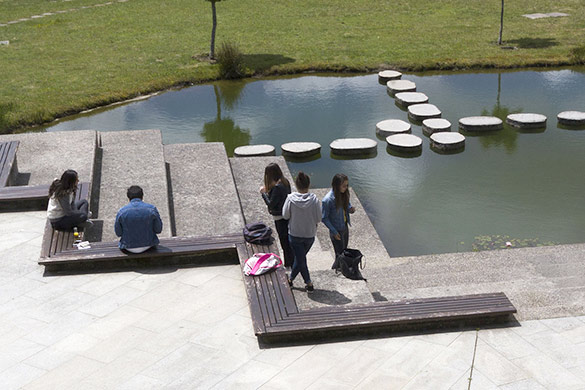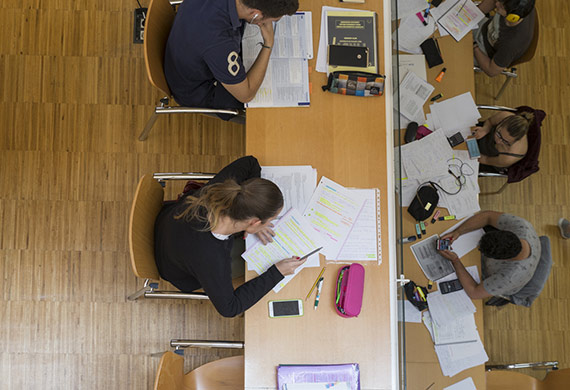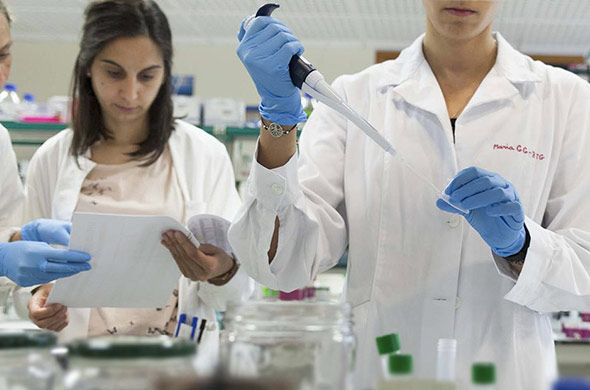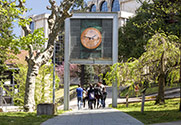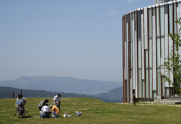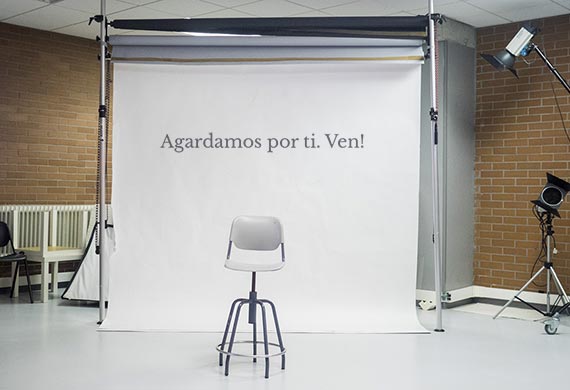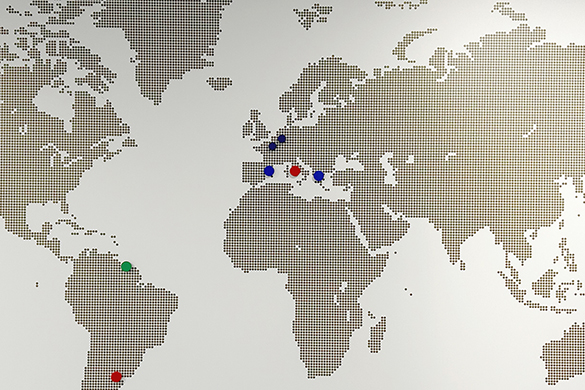
Social responsibility and 2030 Agenda
Social responsibility is at the heart of the modernisation of the Universidade de Vigo, of its economic, social, cultural and environmental sustainability.
The two traditional missions of the university - teaching and research - were joined, in the second half of the 20th century, by a third one related to its commitment to the transfer of knowledge as a means of contributing to the development of its immediate surroundings and other countries.
In recent years, social responsibility has been incorporated as a basic function of the Universidade de Vigo, putting the university community -students, administrative and service staff and teaching and research staff- in permanent contact with representatives of society under the principles of solidarity, human dignity, justice, equity and inclusion, gender equality, respect for human rights and democratic institutions, defence of the environment and the peaceful settlement of disputes.
Through quality research and teaching, the Universidade de Vigo aims not only to create highly qualified professionals in the most varied fields of activity, but also to contribute to the creation of a socially responsible approach to the environment, culture, democracy and inclusive and sustainable progress.
Currently, this third mission is reinforced by the key role that universities play in achieving more sustainable development. The approval of Agenda 2030 in 2015 by the UN General Assembly opens a window of opportunity for public institutions, including universities, to orient their social responsibility strategies towards the achievement of the so-called 17 Sustainable Development Goals (SDGs). The SDGs are aimed at both people and the planet and inspire cross-cutting measures at the local level with the aim of achieving a fairer, more egalitarian, supportive and sustainable world. The Universidade de Vigo is aware of the challenge represented by the 2030 Agenda and is committed to aligning its policies with the 17 SDGs.
Agenda 2030
Accession to the Global Compact
The United Nations Global Compact is a UN initiative whereby companies and organisations that join the initiative commit to respect human rights and labour standards, to preserve the environment, and to act transparently in their activities.
The Universidade de Vigo, adhered to the Global Compact, commits to the 10 principles and 17 objectives through its social responsibility policies and, specifically, in the following ways:
- Implanting the principles of the pact in its own strategy and procedures.
- Disseminate the social responsibility activities carried out by the university community in Duvi.
- Open in the Transparency Portal a specific first level field on social responsibility.
- Promote the pact among collaborators and encourage its application.
Principles
- Businesses should support and respect the protection of internationally recognised fundamental human rights within their sphere of influence.
- Businesses should ensure that their companies are not complicit in human rights abuses.
- Companies should support freedom of association and the effective recognition of the right to collective bargaining.
- Companies should support the elimination of all forms of forced labour, or labour carried out under duress.
- Companies should support the eradication of child labour.
- Companies should support the abolition of discriminatory practices in employment and occupation.
- Companies should maintain a preventive approach that favours the environment.
- Companies should encourage initiatives that promote greater environmental responsibility.
- Companies should encourage the development and diffusion of environmentally friendly technologies.
- Companies should work against corruption in all its forms, including extortion and bribery.
Sustainable Development Goals (SDGs)
Since 2015, the Global Compact has been aligned with the achievement of the Sustainable Development Goals (SDGs):
- End poverty in all its forms in the world.
- End hunger, achieve food security and improved nutrition, and promote sustainable agriculture
- Ensure a healthy life and promote well-being for all at all ages
- Ensure inclusive, equitable and quality education and promote lifelong learning opportunities for all.
- Achieve gender equality and the empowerment of all women and girls.
- Ensure availability of water and its sustainable management and sanitation for all.
- Guarantee access to affordable, safe, sustainable and modern energy for all.
- Promote sustained, inclusive and sustainable economic growth, full and productive employment and decent work for all.
- Build resilient infrastructure, promote inclusive and sustainable industrialisation and foster innovation.
- Reduce inequality within and between countries.
- Make cities and human settlements inclusive, safe, resilient and sustainable.
- Ensure sustainable consumption and production patterns.
- Take urgent action to combat climate change and its effects.
- Conserve and sustainably use the oceans, seas and marine resources for sustainable development.
- Protect, restore and promote the sustainable use of terrestrial ecosystems, sustainably manage forests, combat desertification, halt and reverse land degradation and halt the loss of biodiversity.
- Promote peaceful and inclusive societies for sustainable development, facilitate access to justice for all and create effective, accountable and inclusive institutions at all levels.
- Strengthen the means of implementation and revitalise the global partnership for sustainable development.
The 2030 Agenda in education-learning
University social responsibility in degree courses
The educational offer of the Universidade de Vigo includes a degree in social responsibility, a Master's degree in integrated business administration and corporate social responsibility. Likewise, different degree and postgraduate courses include subjects related to the areas of social responsibility:
Degrees
- Degree in Law: attention to disability / social responsibility / environmental prevention
- Degree in Business Administration and Management: Social Responsibility
- Degree in Public Management and Administration: Social Responsibility
- Degree in Early Childhood Education: attention to disability / social responsibility
- Degree in Primary Education: disability care / social responsibility
- Degree in Social Education: disability care / social responsibility
- Degree in Social Work: disability care / social responsibility
- Degree in Advertising and Public Relations: Social Responsibility
- Degree in Economics: Social Responsibility
- Degree in Commerce: social responsibility
- Degree in Labour Relations and Human Resources: social responsibility / prevention of occupational risks
- Degree in Geography and History: social responsibility
- Degree in Fine Arts: Social Responsibility
- Degree in Foreign Languages: social responsibility
- Degree in Translation and Interpreting: social responsibility
- Degree in Language Sciences and Literary Studies: social responsibility
- Degree in Nursing: attention to disability / social responsibility
- Degree in Physiotherapy: disability care / social responsibility
- Degree in Physical Activity and Sport: disability care / social responsibility
- Degree in Environmental Sciences: social responsibility / environmental prevention
- Degree in Chemistry: disability care / social responsibility / occupational risk prevention / environmental prevention
- Degree in Industrial Chemistry: social responsibility / prevention of occupational hazards / environmental prevention
- Degree in Consultancy and Information Management: social responsibility
- Degree in Marine Sciences: attention to disability / social responsibility / environmental prevention
- Degree in Biology: social responsibility / environmental prevention
- Degree in Food Science and Technology: social responsibility / prevention of occupational hazards / environmental prevention
- Degree in Agricultural Engineering: social responsibility / occupational risk prevention / environmental prevention
- Degree in Forestry Engineering: social responsibility / occupational risk prevention / environmental prevention
- Degree in Energy Engineering: Social Responsibility / Environmental Prevention
- Degree in Mining and Energy Resources Engineering: social responsibility / prevention of occupational hazards / environmental prevention
- Degree in Electrical Engineering: social responsibility / occupational risk prevention / environmental prevention
- Degree in Industrial Electronics and Automation Engineering: social responsibility / occupational risk prevention / environmental prevention
- Degree in Mechanical Engineering: social responsibility / occupational risk prevention / environmental prevention
- Degree in Industrial Technologies Engineering: social responsibility / occupational risk prevention / environmental prevention
- Degree in Telecommunication Technologies Engineering: social responsibility
- Degree in Computer Engineering: Social Responsibility
- Degree in Industrial Organisation: social responsibility / occupational risk prevention / environmental prevention
Masters Degree
- Master's degree in learning difficulties and cognitive processes: disability care
- Master's degree in multidisciplinary intervention in diversity in educational contexts: disability care
- Master's degree in specific educational support needs: disability care
- Master's degree in psychosocio-educational research with adolescents in school contexts: disability care
- Master's degree in sustainable development management: social responsibility/environmental prevention
- Master's degree in industrial innovation and process optimisation: social responsibility
- Master's degree in mining engineering: social responsibility/environmental prevention
- Master's degree in industrial pollution: assessment, prevention and control: social responsibility/environmental prevention
- Master's degree in energy and sustainability: social responsibility/environmental prevention
- Master's degree in occupational risk prevention: prevention of occupational risks
- Master's degree in industrial engineering: social responsibility / occupational risk prevention / environmental prevention
- Master's degree in aquaculture: social responsibility / environmental prevention
- Master's degree in marine biology: environmental prevention
- Master's degree in biological sciences: social responsibility/environmental prevention
- Master's degree in chemical research and industrial chemistry: environmental prevention
- Master's degree in oceanography: social responsibility/environmental prevention
- Master's degree in physical research, sport and health: disability care
- Master's degree in heritage valuation, management and protection: environmental prevention
- Master's degree in creation, management and innovation in business: social responsibility / prevention of occupational hazards / environmental prevention
- Master's degree in agri-food and environmental science and technology: environmental prevention
- Master's degree in management of PEMES: social responsibility / occupational risk prevention / environmental prevention
- Master's degree in integrated project management: social responsibility / prevention of occupational risks
- Master's degree in labour management and direction: social responsibility / labour risk prevention / environmental prevention
Doctoral programmes
- Equity and innovation in education: disability care
- Geotechnologies applied to construction, energy and industry: social responsibility
- Economic analysis and business strategy: social responsibility
- Chemical science and technology: social responsibility / environmental prevention
- Terrestrial ecosystems, sustainable use and environmental implications: social responsibility/environmental prevention
- Education, sport and health: attention to disabilities
- Education and behavioural sciences: attention to disabilities
- Research in advanced technologies and processes in industry: social responsibility / occupational risk prevention
- Methodology and applications in life sciences: social responsibility
- Legal management of the market: social responsibility / prevention of occupational risks
- Energy efficiency and sustainability in design and architecture: social responsibility / environmental prevention
- Sport, physical education and healthy physical activity: disability care
- Marine sciences, technology and management: prevention of occupational hazards
Guidance for students
With regard to guidance for students by the centres in which they are registered, each academic year the Titorial Action Plan (PAT) includes actions aimed at favouring the integration of students into university life and attending to their training and information needs. The PAT, which includes all official university degrees, transcends the specifically academic model, concerned with the transmission of knowledge and the acquisition of skills by students, and is committed to an educational model in which socio-educational functions also converge, such as attention to diversity, orientation to learning or the pursuit of gender equality. In short, it contemplates personal development as well as academic development.
Mentoring
On the other hand, on the initiative of some centres, the university has a mentoring programme for new students, in which veteran students with specific training in study techniques, mentoring, leadership and emotional intelligence help and advise students entering the degree. Given the success of the programme, more and more degrees are being offered each academic year. Centres with mentoring programmes in place:
- School of Telecommunication Engineering
- Faculty of Philology and Translation
- Faculty of Chemistry
- School of Mines and Energy Engineering
Educational innovation groups
The educational innovation groups (GID) are stable working groups of university teaching staff whose purpose is to develop actions aimed at training, innovation and renovation of the educational model with the aim of favouring student learning. If you want more information about the GID, click on the following link.
The 2030 Agenda in research and knowledge transfer
We present the research groups of the Universidade de Vigo in areas linked to university social responsibility:
Disability
- Educational evolutionary psychology team (HI9)
- Information and Communication Technologies in Education Team (DO1/B, TICEDU)
- Educational Diversity Research Team (DO2, EIDE)
- Special Didactics Team (HI6)
- Different perspectives in Sport Research: Gender, Integration and Creativity (H16)
Ergonomics
- Design and Engineering Team (EG2)
- Team of organic repercussions of physical activity (HI10)
Degenerative diseases (Alzheimer's, ALS, Parkinson's, dementia etc.)
- Public health and neurology team (MP1)
Autism
- Psychosocioeducational analysis and intervention team 2 (CC1)
Sign language
- Sign Language and Spanish Language Team (HI4)
- Telematic Technologies Team (TC1)
- Sign Language and Spanish Language Team (HI4)
Blind people
- Motor skills team for all (DE4)
Seniors and health
- Team of Educational Intervention in Physical Activity for the Promotion of HealthyFit Health (HI22)
- Bioengineering and Chronobiology Team (SC4)
- Sport and Health Research Team (HI20)
- Public health and neurology team (MP1)
- Physical activity and health research team (DE3)
- Physical activity for all team (DE4)
- Economy, Society and Territory Team ECOSOT (EA7)
- Health, Sexuality and Gender
Active development
- Bioengineering and Chronobiology Team (SC4)
- Team of Educational Intervention in Physical Activity for the Promotion of HealthyFit Health (HI22)
Ethnic minorities, poverty and social exclusion
- Psychosocio-educational analysis and intervention team 2 (CC1)
- Economy, Society and Territory Team ECOSOT (EA7)
- Labour Law and Social Security Team (DT1)
- Collaboration and Innovation for Educational and Social Equity (CIES-UVigo)
Prevention of violence (youth, abuse). Family mediation.
- Legal Psychology Team (PS1)
- Health, Sexuality and Gender
- Procedural Law Team (DL1)
Immigrants, minors, the elderly, women
- Educational intervention team for groups at social risk (L10)
- Different Perspectives in Sport Research: Gender, Integration and Creativity (HI6)
- Economics, Society and Territory Team ECOSOT (EA7)
- Health, Sexuality and Gender
- Criminal Law (DP1)
- Translation & Paratranslation (T&P) Team (TI4)Civil Law Team (DC2/A)
- Evaluation of Policies, Programmes and Plans Team (L4)
- Science Didactics. Xénero, Teoría e Hª da Educación, do Pensamento e da Ciencia (DES)
- Theory and History of Education Team (TH1)
- Minorities and GLBT Culture Team (ES4)
Accessibility of ICT for people with impairments, disabilities, handicaps. E-learning
- Information and Communication Technologies in Education Team (DO1/B, TICEDU)
- Team of technologies for the information society (ET1/A)
- Team of Developmental Psychology of Education (HI9)
- Different Perspectives in Sport Research: Gender, Integration and Creativity (HI6)
- Information and Communication Technology Team (E-TIC) (ET1/B)
Corporate Social Responsibility (RSC)
- Labour and Social Security Law Team (DT1)
- Strategic Development: Organisation and Territories G4+(OC1/A)
- Marketing Team - Vigo (I-MARK)
- Accounting and Auditing (EF9)
- Communication Research Team (CS1)
- Economic Analysis Team (EA8/A)
Ethics
- Science Didactics. Xénero, teoría e historia da educación, do pensamento e da ciencia (DE5)
- Translation & Paratranslation Team (T&P) (TI4)
International Cooperation
- International Legal Cooperation Team (DI1)
- Financial Economics Team 5 (EF5)
- Strategic Development: Organisation and Territories G4+ (OC1/A)
Welfare
- Economics Team Sociedade e Territorio ECOSOT (EA7)
- Group of Researchers in Empirical Economics- GRIEE (EA10)
Ecological Sticking
- Applied Economics Team (EA5)
- MEDEA Iuris
Dependence
- Group of Researchers in Empirical Economics- GRIEE (EA10)
- Legal Psychology Team (PS1)
Labour Risks
- Labour Law and Social Security Team (DT1)
University Social Responsibility
Social commitment
- Volunteering and development cooperation
- Healthy University
- Culture in Ourense, Pontevedra and Vigo
- Lingua galega
Commitment to the environment
Commitment to people
Volunteering and cooperation for development
The value that people have for Universidade de Vigo translates into its commitment to solidarity action aimed both at its immediate surroundings through volunteering projects and at developing countries through the implementation of initiatives aimed at knowledge transfer.
Máis información:
Área de Responsabilidade Social e Cooperación
Vicerreitoría de Benestar, Equidade e Diversidade
Edificio Ernestina Otero
+34 986 130 261
direc.equidade@uvigo.gal
